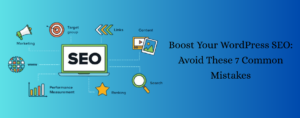Search engine optimization (SEO) is crucial for any website, and WordPress is no exception. If you’re running a WordPress site, you want to make sure you’re getting the most out of your SEO efforts. But even with the best intentions, many site owners unknowingly make SEO mistakes that can hurt their rankings and traffic. In this post, we’ll cover 7 common SEO mistakes to avoid on your WordPress site.
1. Ignoring Mobile Optimization
With mobile traffic accounting for more than half of global web traffic, it’s essential that your WordPress site is mobile-friendly. Google uses mobile-first indexing, meaning it will prioritize the mobile version of your site for ranking purposes. If your site isn’t optimized for mobile, you risk losing valuable traffic.
Tip: Use responsive WordPress themes that automatically adjust to different screen sizes.
2. Not Using SEO-Friendly Permalinks
WordPress has a default permalink structure that isn’t ideal for SEO. By default, WordPress uses URLs that are filled with numbers and characters, making them hard for search engines to interpret. A clean, descriptive permalink is much better for both users and search engines.
Tip: Go to Settings > Permalinks and choose the “Post name” option for better SEO.
2. Not Using SEO-Friendly Permalinks
WordPress has a default permalink structure that isn’t ideal for SEO. By default, WordPress uses URLs that are filled with numbers and characters, making them hard for search engines to interpret. A clean, descriptive permalink is much better for both users and search engines.
Tip: Go to Settings > Permalinks and choose the “Post name” option for better SEO.
3. Neglecting Meta Descriptions
Meta descriptions are short summaries that appear under your page title in search engine results. They provide a sneak peek into your content and can influence whether someone clicks on your link. Many WordPress sites fail to add or optimize meta descriptions, which can hurt click-through rates.
Tip: Use an SEO plugin like Yoast SEO to easily add and optimize your meta descriptions.
4. Overlooking Image Optimization
Images are a crucial part of any website, but if they’re too large, they can slow down your page load time. Slow loading speeds can negatively impact both user experience and SEO rankings. Additionally, images without proper alt text miss an opportunity for SEO improvement.
Tip: Compress images before uploading and use descriptive alt text that includes relevant keywords.
5. Not Using Internal Linking
Internal linking helps search engines discover and index your content more effectively. It also keeps visitors engaged by guiding them to other relevant posts or pages on your site. However, many WordPress site owners forget to include internal links in their content.
Tip: Add relevant internal links to blog posts, product pages, and service pages to improve SEO.
6. Ignoring Schema Markup
Schema markup is a type of code that you can add to your WordPress site to help search engines understand your content better. It can also enhance your search engine listings with rich snippets, which can increase click-through rates.
Tip: Use a plugin like Schema Pro to easily add schema markup to your pages and posts.
7. Forgetting About SEO-Friendly Content
Content is king when it comes to SEO. Creating high-quality, relevant, and keyword-optimized content is essential for ranking well in search engines. Many WordPress users focus on technical SEO but forget that content still plays the most significant role.
Tip: Conduct keyword research, and create valuable content that answers the questions your target audience is asking.
Final Thoughts
SEO for WordPress doesn’t have to be complicated. By avoiding these common mistakes, you’ll be well on your way to improving your site’s rankings and attracting more organic traffic. Take the time to optimize your site, and you’ll see long-term results.
Need help with your WordPress SEO? Contact me — I’m happy to help you optimize your site!




